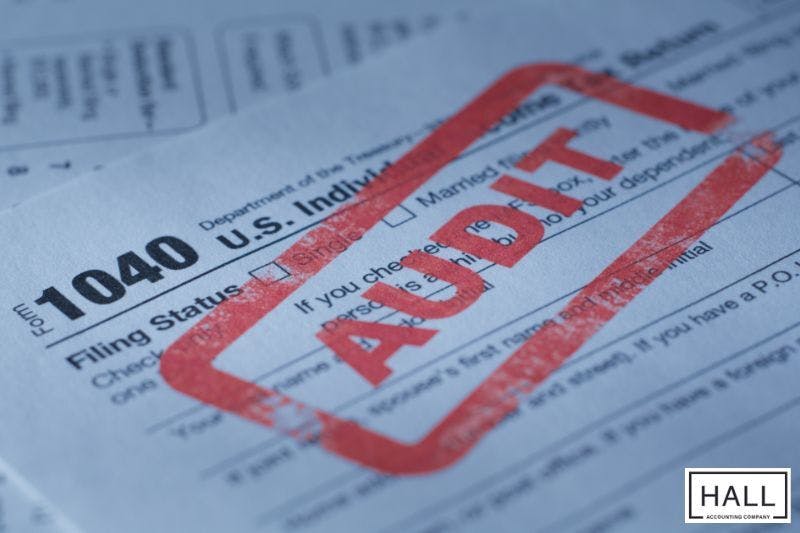
The Internal Revenue Service or IRS audits approximately one million people each year in the United States. Because the auditors select filings randomly, keeping accurate records will not ensure they do not choose your tax filings for an examination. Receiving the letter and learning you will undergo an audit is always stressful for filers. It can overwhelm even the most diligent bookkeepers. While they randomly select many individuals, others may receive the notice because of errors or discrepancies.
After receiving an IRS audit letter envelope, it's in your best interest to open it quickly and take action. An irs audit letter will usually come from the Internal Revenue Service but may also come from the Department of Treasury. Finally, the notice will include the name of the IRS agent completing the examination with their signature.
Does the IRS Send Letters Using Certified Mail?
The IRS audit envelope will arrive via certified mail and list your full name, taxpayer ID or social security number, the form number, and the Information they are reviewing. It will also provide the IRS agent's contact information for more information or questions on the process or specific case. It is essential to remember that an IRS auditor will never reach out by phone or email or demand payment immediately.
How Will I Know the IRS is Auditing Me?

According to the Internal Revenue Service website, they will notify you by certified mail if they select you for an audit. They will send the notification to the individual or business's full name and address they have on record. The letter, in most cases, "Notice of Audit and Examination Scheduled," will explain the reason for the review.
An IRS letter will clearly state the reasons for a review and audit, and the year the taxpayer filed the return. It will also provide instructions, including what additional information, clarification, or documentation they need to complete the process. Finally, the notification will give a deadline for responding to the IRS's request. Other letters the IRS may send during the audit process include:
The general 30 day notice period
The IRS notify you with the General 30 Day letter when they complete the audit process on the tax filing. It will give the auditor's findings and details about their proposed changes on the tax return. If you agree with their changes to the return, simply sign the agreement form and mail it back to the IRS. If you disagree with the auditors' adjustments, you can begin the procedure for filing an appeal.
The notice of deficiency
In some audits, the IRS may skip the General 30 Day letter and send a Notice of Deficiency. It will provide the amount of taxes you owe and a deadline they strictly enforce for paying the outstanding balance. You can pay the total amount within 90-days or file a petition to dispute their findings with the court.
The Request for Consideration of Additional Findings
The Request for Consideration of Additional Findings is a letter that will provide the auditor's proposed adjustments and the report of findings. If you agree with the adjustments, you can sign and return the form. If you dispute the auditor's conclusions, you must file an appeal within 15 days of the letter's receipt.
What Time of Year Does the IRS Mail Audit Letters?
The IRS typically issues audit letters within one year of filing. However, according to the statute of limitations, they have up to three years after the taxpayer files taxes in most cases. If the auditor finds items such as excessive underestimates of income, they may add three years to the statute's deadline for the audit.
Filers most commonly receive letters from the IRS notifying them of the examination in the fall or winter months of the previous tax filing year. Yet, the auditors can mail the notifications throughout the year. There are cases for which the statute of limitations does not apply, and they include:
Fraudulent tax returns
Failure to file a tax return
Intentionally evading the payment of taxes
There is no deadline for auditing tax returns that involve tax fraud or evasion. They are federal crimes, and if the IRS determines the filer intentionally misled or provided false information, the taxpayer could face steep fines and jail time.
The Most Common IRS Audit Causes

Most IRS audits will let the tax filer know that a portion of their tax return is under review. The IRS uses various tools for selecting filers and tax returns for audits. One system they use is a Discriminant Information Function or DIF. They run every tax return through the DIF each year. The tool compares them to similar filings, scores them, and assigns each one a rating. The score and rating could trigger the need for an audit.
The IRS auditors also use an algorithm called the Unreported Income Discrimination Function or UIDF. The tool will review returns to determine various factors, including whether businesses are spending more income than they earn. Some of the most typical reasons for an IRS audit include:
Errors including input issues or mathematical mistakes
Filing status
Unreported income
Mismatching information such as income not matching a W-2 or 1099 form
Itemized deductions
Questions regarding the number of dependants
Eligibility for credits
Tax returns for people with incomes of $200,000 or higher
Foreign accounts
The IRS also more commonly audits small business owners and those who share stock in a partnership. If a certified tax professional did your taxes, reach out to them for review and clarification.
There are also times the IRS selects individuals for an audit because a person or business they have had transactions with is undergoing an audit. Internal Revenue Service auditors will complete many of the examinations by mail. Yet, there are also times they will want to conduct an interview and ask for a face-to-face meeting.
How to Respond to IRS Audit Letters
After receiving mail via certified mail from the IRS, immediate action is critical. Yet, it is also wise to contact a tax professional before speaking with the auditor directly. A tax professional could help you review the notice and return in question. They could assist in collecting the items needed to complete the audit. Most times, the auditor needs further explanation of the circumstances or additional documentation, such as receipts. All notifications from the IRS will provide you with the deadline for taking action, and it is vital to reply before that date.
Federal tax audits are complex and challenging for individuals without tax law knowledge. Without knowing, giving the wrong information or documentation could lead to a more extensive and costly examination. Failing to meet IRS deadlines or satisfy their requests could lead to garnishments, levies, property liens, and foreclosure.
If the auditor determines the filer was fraudulent or evasive, there could also be criminal charges. The IRS conducts thorough investigations and reviews of the tax return in question. They will deeply examine every aspect of finances and the filing before issuing their findings. After receiving an audit notification, if you have a return with particular circumstances or significant documentation, you can request a meeting with the auditor and a certified tax professional or experienced tax attorney, depending on the issue
Still Unsure?
Our Team is happy to schedule a time to learn more about your needs and find a plan that’s right for you.
Writing a response letter to the IRS

Taxpayers should begin working on a response to an IRS audit letter right away. They should gather all the documentation the auditor requests or contact the source to ask for a copy if necessary. When writing a response letter for the IRS auditor, it should include:
The response date
The filer's information, including address, tax ID or social security number, and current contact information
The audit letter number and IRS agent completing the examination
Response to each question on the IRS audit letter
Address each question and provide information on the circumstances of errors, if applicable
List of the names of the supporting documentation following the letter
An IRS tax audit can be expensive and overwhelming. Yet, while notification of an audit of your tax filings is never fun, it will be over quickly if you follow the instructions and provide the additional information and documentation. Keep in mind the Internal Revenue Service chooses most of the taxpayer's filings for audit randomly, and there is nothing wrong with the income tax return.
When tax filers don't respond by the deadline, they will receive an IRS deficiency notice and further action, including garnishments and liens. It is helpful to have a solid understanding of the process by reaching out to a tax professional. They could guide you through the process while avoiding errors leading to a more extensive audit. By following these steps, you have the best chance of reaching a timely and favorable resolution.
If you receive a phone call, message via social media, or an email from the IRS asking for you to provide sensitive information, it is fake. The Internal Revenue Service will never reach out and ask for data, such as bank account details, private financials, or credit card numbers.
Final Thoughts from the Hall Accounting Team
The dreaded IRS audit letter is something no one wants to receive in the mail but it will inevitably come at some point in your life.
Don’t make it any more stressful than it needs to be. The Hall Accounting team has been dealing with IRS audits for a long time and we know how to get through it without you losing sleep. When you have tax problems you need an expert you can work with in a hurry. But you also don’t have to wait for an audit to get savvy about your taxes. Call us today about your audit letter or call us about tax planning services so we can get your tax liability reduced in the long run. But whatever your need - take action before you have to deal with unnecessary problems.